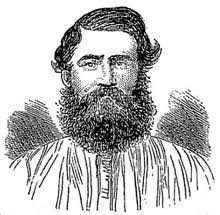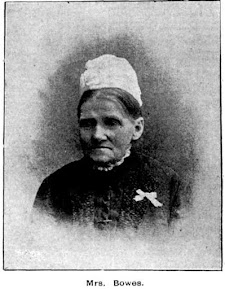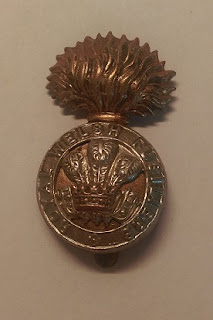A summer obsession!
Well, the silly season has started .... yes Summer
= Cricket and today's blog is about a cricket player who was the first NSW
Cricket Captain and the raucous, rambunctious but endearing cricket fanatic
from many years later.
First up the cricketeer.
GEORGE HENRY BAYLEY GILBERT
George was born in Cheltenham England in
September 1829 the eldest child of George Gilbert, a farmer and his wife Sarah
Rose. His brother Walter Raleigh and his cousins, EM and WG Grace were keen and
well-known cricketeers.
George played six first class matches in England
before he sailed to Australia in 1852 in the "Mary Ann" accompanied
by his cousin William Gilbert Rees. William was an explorer and George
accompanied him on an expedition into the interior of NSW almost immediately
they arrived probably looking for gold. William continued exploring which
eventually led him to New Zealand where he founded Queenstown, but George
remained in Sydney.
Gilbert enjoyed playing cricket and often took
place in single-wicket tournaments in the Domain. Large crowds came to watch,
and clubs were formed and by 1856 several were playing regularly.
A challenge came from Victoria issued in
"The Argus" newspaper. The colony had played three first class matches
against Tasmania and wanted to widen its scope. The Sydney clubs met, formed a
selection committee and chose 11 players and an umpire. George Gilbert accepted
the position of Captain. Communication was made and soon the team sailed for
Melbourne.
In January 1856, George Gilbert sent the first
ball down delivered in contest between the two rivals. Victoria was dismissed
for 63 in 34 overs and at the end of the first day NSW led by 13. That night
some of the Victorian team attended the Benevolent Asylum Ball until the early
hours and the effects showed in the next day's play with the favorite’s
dismissed for 28 in 23 overs with the NSW side just needing 16 runs to take the
match. The Victorians held on bravely, but the NSW team won the day. George
Gilbert top-scored with seven wickets.
NSW won the return match played at the Domain in
January 1857. In 1858 George took his side back to Melbourne and claimed a
"hat-trick". HIs performance was highly praised.
George later played in 1861-62 for the NSW XX11
against the first English team to visit Australia. Whilst a member of the
Albert Club in 1863 he hit the second 100 scored in the Colony and continued
playing as a genuine all-rounder until 1866.
After the mid 1860's George played less cricket
and scouted for jobs to feed his burgeoning family. By the 1880’s he was
reported to be homeless and in 1885 was one of the many gold prospectors
traipsing around New Zealand looking for his fortune. He returned to Australia
and lived on grants from time to time from the NSW Cricketing Association. He
died of throat cancer and a poor man in June 1906 at his daughter’s home in
Summer Hill and was buried in a pauper’s grave in Section 5 of the old Anglican
area near the “Little Serpentine” canal. His grave was unkempt until in 2008
when family members and Cricket NSW marked his final resting place with a
headstone marked “now recognised by a proud family”
George Gilbert headstone - author's own
And now for the very vocal cricket fan
STEPHEN HAROLD (YABBA) GASCOIGNE
Stephen Gascoigne was born on March
1878 at Redfern, Sydney, son of Amos Gascoigne and his wife Catherine. As a
child he was nicknamed 'Yabba' because he talked a lot! He married Ada in 1899
and the following year he volunteered to fight in the Boer War and served in
the Eastern Province enlisting in April but was discharged medically unfit in
October that same year. Gascoigne supported his growing family by being a
‘rabbito”, selling dressed rabbits' door-to-door in Balmain and nearby suburbs.
His big voice could be heard calling out “Rabbo, wild rabbo” a mile away!
Yabba loved his cricket and seldom
missed a Sheffield Shield or Test Match at the Sydney Cricket Ground. He was a
tall, big man with close cropped hair, wore his “uniform” of a cap, dark
trousers and white shirt . He watched the game intently from his favourite spot
on the hill in front of the scoreboard. He rarely drank more than a few bottles
of beer that he brought with his lunch and never shouted abusive comments but
rather witty observations on play delivered at the top of his lungs for which
he is best remembered for.
“Yabbaisms” such as:-
"Your length's lousy but you bowl a good width!"
"I wish you were a statue and I were
a pigeon." To a slow bowler
"Leave our flies alone. They're the
only friends you've got here.". to Douglas Jardine who was swatting a fly
“Yabba” became an attraction in his
own right for those who watched cricket in Sydney but was also a favourite with
players.
Gascoigne died of heart disease in
the Lidcombe State Hospital in January 1942 and was buried in the Anglican area
of Rookwood near the Strathfield entrance. His wife Ada joined him ten years
later.
Stephen "Yabba" Gascoigne headstone - findagrave with thanks
He was held in such high esteem that
when the NSW Cricket Association met after his death, they stood in silence in
his memory.
The Hill area was replaced with seating
in the early 1990s and this area became formally named Yabba’s Hill. In
2007 the old Stand and Yabba Hill were
demolished to make way for the new Victor Trumper Stand. In December 2008
a bronze statue of Yabba was unveiled at the Sydney Cricket Ground in the
area of the hill. It shows Yabba in his usual pose, one hand acting as a
megaphone, in the act of delivering one of his famous interjections
Bronze statue of Stephen "Yabba" Gascoigne - Wikipedia
If you have any comments about this blog, please
add them below or do so at the group Facebook page under
rookwoodcemeterydiscoveries
Or send me an email at
I have once again used many references about both
men from ancestry.com, Trove and Google.
Well, that’s a wrap for 2022 from this page. Time
for a short break to spend time with family and friends over the festive
season.
Thank you all for following this page and for the
encouraging remarks and personal messages I have received since I started this
blog in March.
I’ll be back in 2023 with more tales from
Rookwood.
In the meantime, I wish you all the best for the
season and for the coming year.
Until next year…







Comments
Post a Comment